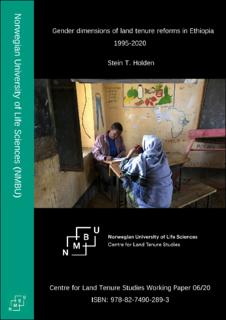Resource information
This chapter investigates how land tenure reforms in Ethiopia have influenced the position of women in terms of land tenure security, access to land, decision-power over land within households, as well as the gendered impacts of these tenure reforms on land investments, land productivity, land renting, and household consumption welfare. It is based on a careful screening of the relevant literature based on its quality and critically examining the reliability of the causal effects in each study. As most studies are based on survey data, studies that have been able to provide reasonably robust quantitative assessments are utilized. The review concludes that there exists strong evidence that the low-cost land registration and certification reform in Ethiopia has contributed to strengthening women’s land rights and decision-power over land and this has had positive welfare effects in female-headed as well as male-headed households. More research is needed to study the productivity and welfare effects of the ongoing 2nd Stage Land Registration and Certification reform but early findings indicate that it has contributed to formally document parcel-level land rights of women that are close to that of men even in the Tigray region where 1st Stage Land Registration and Certification was in the name of the head of household that in most cases was a man.


